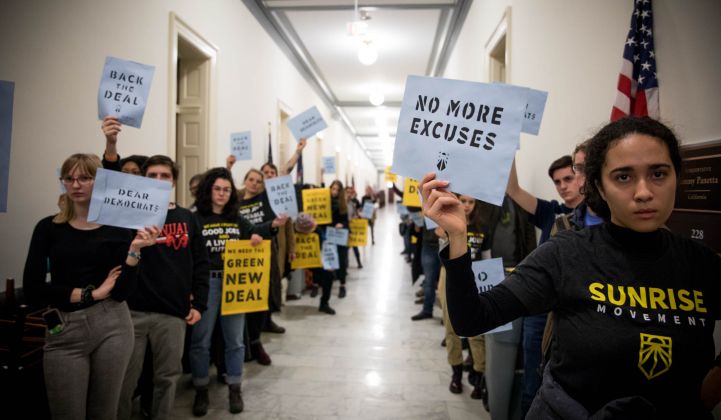Representative Alexandria Ocasio-Cortez and Senator Ed Markey on Thursday released their much-anticipated resolution for a Green New Deal. It calls for 100 percent clean energy to supply all U.S. power through a decade-long national mobilization.
Though the resolution adds more details to the idea of a Green New Deal, which started as an ambitious but broad concept to create environmentally just jobs and fight climate change, the resolution is still a starting point. Further legislation would determine how the federal government meets the goals laid out in the document.
And the goals are significant.
The resolution calls for supplying all power using 100 percent "clean, renewable and zero-emission energy sources," a departure from previous statements indicating that the plan would focus on renewables only. It also calls for deploying distributed smart grids, upgrading buildings for efficiency, updating infrastructure and building resiliency through community-focused projects — all in 10 years. And it targets net-zero emissions.
The plan also calls for righting systemic injustices for communities disproportionately impacted by environmental issues and economic inequality. The plan notes that making healthcare, affordable housing and higher education available — and especially prioritizing these goals in vulnerable communities — will be paramount to achieving the overarching policy’s goals.
The text sketches an overhaul of the transportation system that would include affordable public transit, high-speed rail and infrastructure and manufacturing for zero-emissions vehicles. The deal also concentrates on cleaning up sectors where electrification isn’t an easy solution for reducing emissions, such as manufacturing and agriculture.
In a press conference introducing the legislation, Rep. Ocasio-Cortez said the resolution acts as a "first step."
“We’re here to say small incremental policy solutions are not enough. They can be part of a solution, but they are not the solution unto itself," she said. “Today is not just a big day for us as a delegation, us as a party, us as a movement, but this is a big day for activists all over the country and frontline communities all over the country. Today is a big day for people who have been left behind.”
In an interview with NPR published Thursday, Rep. Ocasio-Cortez said that the severity of climate change far outpaces the urgency of the efforts so far to combat it.
“Even the solutions that we have considered big and bold are nowhere near the scale of the actual problem that climate change presents to us, to our country and to the world,” said Ocasio-Cortez.
She added that large-scale government intervention is needed because a more hands-off approach hasn’t done the job.
“For 40 years, we tried to let the private sector take care of it,” she said. “What we’re here to say is that government is not just for cleaning up other peoples’ messes, but it’s also for building solutions in places where the private sector will not.”
Sen. Markey said during the Thursday press conference that the resolution is by design “silent on any individual technology which can move us toward a solution [for] this problem,” which leaves room for continued debate on 100 percent clean energy versus all-renewables. An FAQ distributed alongside the resolution, however, notes "the plan is to transition off of nuclear and all fossil fuels as soon as possible." The FAQ also argues that, thus far, carbon-capture utilization and storage has not proven effective.
Markey also noted on Thursday that supporters of the resolution will be working to get the same tax benefits for renewables and electric vehicles that have been afforded to fossil fuels in the past.
Also appearing at the press conference, Democratic Sen. Ron Wyden of Oregon, who is ranking member on the Senate Finance Committee, said, "It’s my intention to work with all of these good people to throw the dirty energy tax relics of yesteryear into the garbage can, and work to put clean energy front and center for a healthier future for Americans."
The deal is easily the most serious piece of climate legislation debated on the national stage in years. Already, several 2020 Democratic presidential candidates have endorsed the idea of the deal, even as details have remained scarce. In the Thursday press conference, Rep. Ocasio-Cortez said that when introduced, the legislation will have over 60 co-sponsors in the Democratic caucus. Over 40 Democratic representatives also came out in support of creating a select committee in Congress to work on the details of a deal.
Though that specific committee didn’t come to fruition, House Speaker Nancy Pelosi on Thursday unveiled the members of a committee focused on “the climate crisis.” Another indication that climate change is gaining political capital: This week the House Committee on Energy and Commerce hosted its first committee hearing on climate change in six years.
“Really, what I hope we’re able to do as a party and as a nation is rediscover the power of public imagination,” Ocasio-Cortez told NPR. Rep. Ocasio-Cortez is not a member of the "climate crisis" committee, which doesn't have legislative authority, but she will serve on the Oversight and Financial Services committees.
Though the plan will be expensive, and the resolution does not outline a method to pay for it, Ocasio-Cortez said any investments will eventually pay for themselves. In speaking with NPR, she compared the benefits of her overhaul policy to the wall that President Trump and some Republicans want to build on the U.S.-Mexico border for $15 billion to $25 billion, a policy she does not support.
“We have the responsibility to show what another America looks like,” she said. “What if we actually took all that concrete and poured it into roads? What if we took all of that engineering and dedicated it to new energy? What if we took all of that, but actually invested in something that will have payback and a return on our investment for the American people?”
This story has been updated with comments from a press conference held to highlight the resolution.




